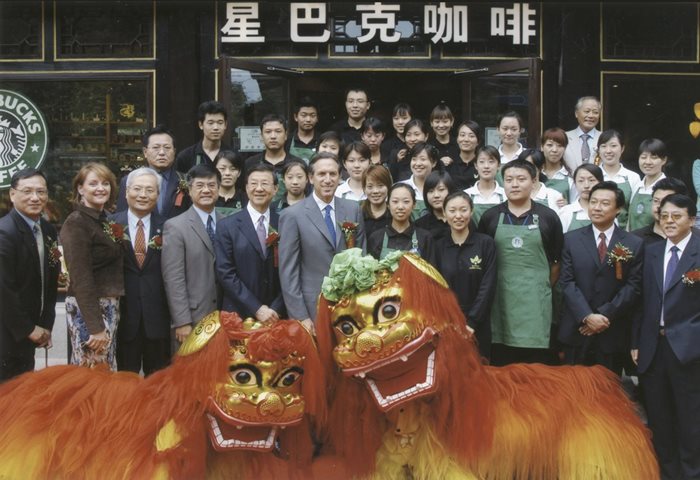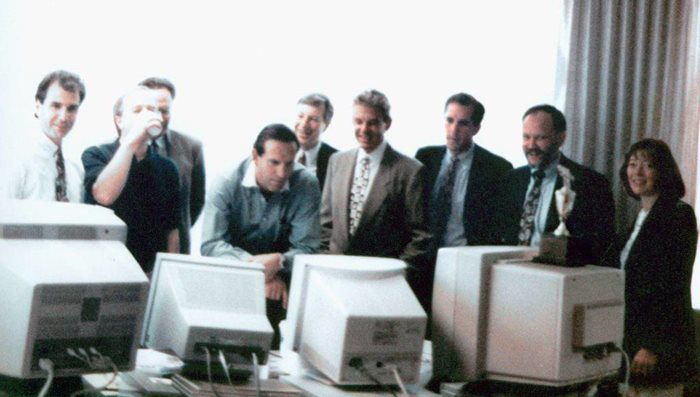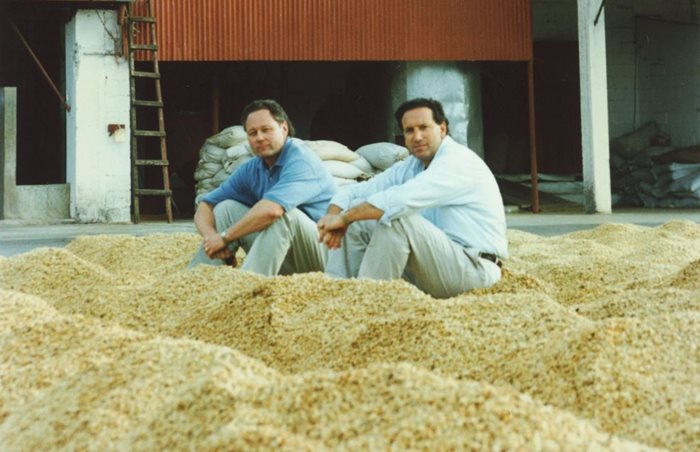Continuing our series exploring Starbucks’ profound influence on the business of coffee, in Pt. 2 we examine the brand’s role in popularising premium espresso-based beverages around the world. In conversations with leading coffee professionals we also discuss how the Seattle-based coffee chain has championed ethical practices in the workplace and across its global supply chain. Catch up on
part one here.
.jpg.aspx?lang=en-GB&width=700&height=446)
Starbucks CEO, Kevin Johnson (left) with Chairman Emeritus, Howard Schultz, at the latter’s 2018 Farewell Ceremony after working with the company for 24 years | All photos courtesy of Starbucks Coffee Company
Not your average cup of Joe
Premiumisation has consistently been a successful strategy for Starbucks over the years. The coffee chain has introduced higher quality products, deftly placed in the correct market context, to promote and catalyse today’s booming global coffee culture.
“The fact that Starbucks had espresso machines across their stores and espresso beverages on their menu certainly helped to build appreciation of high-quality coffee among consumers,” says Bakke. “Creating a model and executing it to a high standard in terms of store design and consistency made the café industry up its game.”
In 1996, Starbucks began to highlight small quantities of exceptional coffee with the Starbucks Limited Edition programme. In 2004 it offered its best single-origin coffees as ‘Black Apron Exclusives’, starting with a rare 100% Kona coffee from Hawaii. In 2010, that programme evolved into Starbucks Reserve.
"Starbucks helped expose the average coffee drinker to specialty coffee"
– Scott Rao, coffee consultant and author
Reserve is arguably the most significant of Starbucks’ brand augmentations over the years. It has enabled the business to penetrate areas of the specialty coffee market typically dominated by smaller boutique operations. It has also cemented Starbucks as a truly global brand, with six Reserve Roastery stores in Seattle, Shanghai, Milan, New York, Tokyo and Chicago, serving as regional focal points for international markets and testbeds of innovation – from product development to new store formats.
“My view on Starbucks in the early days of my career was probably quite negative,” says Henry Roberts, CEO and Founder of US coffee specialty coffee chain Two Hands.
“But as I’ve grown my business, my respect for scale and companies like Starbucks has grown too. Starbucks has continually evolved quickly and effectively to maintain its position as a coffee leader in the US market,” says Roberts.
Starbucks’ savvy mass marketing of the latest coffee trends – from the Frappuccino in 1995, to the introduction of cold brew in 2015 – proved revolutionary in introducing generations of younger consumers to the coffee shop marketplace and putting iced coffee beverages firmly on the map.
While countless businesses have benefitted from Starbucks laying the ground for consumers’ love of new coffee products, its huge marketing firepower has attracted some criticism for eclipsing innovation by smaller operators.

Schultz joins company leaders, dignitaries and baristas in Beijing for the opening of the company’s first store in China on January 11, 1999
“We’ve learned how to sell a ton of coffee from Starbucks,” says Heather Perry, VP and Director of Training & Consulting at US specialty coffee business, Klatch Coffee. “However, one criticism is that Starbucks could be perceived to be snapping up some innovations generated by smaller specialty coffee shops. But ultimately, its presence has encouraged me to constantly push my business to stay ahead,” she adds.
“In its first few decades in America, Starbucks helped expose the average coffee drinker to what we would call specialty coffee and, in that sense, they did a great service,” says Scott Rao, a coffee consultant and author with 27 years’ industry experience.”
“They helped popularise specialty coffee and pushed the envelope in terms of being able to charge a sufficient amount of money for a good coffee, which was a struggle until the mid-1990s.”
“On the other hand, one could argue that Starbucks has commoditised specialty coffee, focused too much on branding and efficiency and not enough on quality. They’ve also opened the door to greater acceptance of dark roasting, which many of us in the specialty industry aren’t fond of. So, Starbucks has been a mixed blessing for the coffee industry,” Rao adds.
Partners in coffee
In addition to introducing consumers to the merits of high-quality coffee, Starbucks has also shown thousands of baristas the ropes in its 50-year history. In the process of training its near 400,000 partners worldwide today, the Seattle-based chain has set the wheels in motion for countless careers in coffee, laying the groundwork for expertise, knowledge, and entrepreneurship in the
coffee industry.
Starbucks was also a pioneer of worker benefits and support in the US. Way back in 1988, it offered full health benefits for eligible full-time and part-time partners, including coverage for domestic partnerships.
“We’ve learned how to sell a ton of coffee from Starbucks"
– Heather Perry, VP, Klatch Coffee
In 1990, the company unveiled its landmark Starbucks Mission Statement. “To establish Starbucks as the premier purveyor of the finest coffee in the world while maintaining our uncompromising principles as we grow”.
Following its IPO in 1992, Starbucks employees became known as ‘partners’, enabling them to access a stock option programme known as ‘Bean Stock’.
In 2008 Starbucks’ mission statement evolved again to “inspire and nurture the human spirit – one person, one cup and one neighborhood at a time.”
That spirit was demonstrated when, at an annual meeting of shareholders in 2013, a stockholder voiced concerns Starbucks was losing customers due to its stance of marriage equality. Then CEO Howard Schultz responded:
“Not every decision is an economic decision. The lens in which we are making that decision is through the lens of our people”.

Starbucks’ leadership team watch the company’s first day of trading on the Nasdaq in 1992
Among the many remarkable episodes in Starbucks’ history was its handling of a 2018 incident when two African American customers were arrested in Philadelphia after staff wrongfully alerted the police to their presence. The response from Starbucks was unequivocal. The coffee chain took the decision to close 8,000 company-owned US stores on May 29, 2018, and provide around 175,000 staff with training and guidance on unconscious racial bias – an exercise estimated to have cost Starbucks around $20m in lost revenues alone.
The move was a masterclass on how to tackle a PR crisis. More importantly, it affirmed Starbucks’ commitment to racial justice. “I’ve spent the last few days in Philadelphia with my leadership team listening to the community, learning what we did wrong and the steps we need to take to fix it,” said Starbucks CEO Kevin Johnson at the time.
“While this is not limited to Starbucks, we’re committed to being a part of the solution,” he added.
Starbucks’ commitment to racial equality, inclusion and equal opportunities remains at the forefront of its operations.
In 2018, Starbucks became one of the few companies in the world to achieve 100% gender pay equality across its US business, the result of a 10-year initiative to improve transparency around recruitment and promotions.
But ethical practice is not confined to Starbucks’ coffee shops; it is also evident in its efforts to support coffee growing communities.
As the world’s largest coffee shop operator – and purchaser of an astonishing 3% of the world’s coffee supply – Starbucks has played a major role in supporting coffee farmer profitability and has been a major purchaser of Fairtrade-certified coffee since 2000.
“Since 2000, Starbucks has become one of the largest buyers of Fairtrade coffee globally. We estimate they will have generated $100m in Fairtrade Premium payments for coffee farmers by the end of 2021,” says Xiomara J. Paredes, Executive Director of Fairtrade’s Producer Network in Latin America and the Caribbean (CLAC).
“Given that Fairtrade cooperatives can spend Premium funds on business, community and environmental initiatives of their choosing, Starbucks’ commitment to Fairtrade has made a significant difference to farmers worldwide.

Starbucks coffee buyer, Dave Olsen, and Howard Schultz at a coffee farm in Guatemala in the 1990s
“Environmental protection is ingrained in Fairtrade, sowe are heartened by Starbucks’ sustainability work and planet-friendly pledges, including their commitment to provide 100 million climate-resilient coffee trees to farmers by 2025. We hope they will continue to take bold steps towards sustainability in the years ahead,” she adds.
Another of Starbucks’ significant contributions to ethical coffee sourcing has been the development of the C.A.F.E. (Coffee and Farmer Equity) practices programme, one of the coffee industry’s first sustainability standards verified by third-party experts – environmental consultancy SCS Global.
Developed in partnership with environmental advocate Conservation International and first launched in 2004, Starbucks achieved the milestone of sourcing 99% ethically sourced coffee through C.A.F.E. Practices in 2015. Today, the programme includes over 400,000 coffee farmers in 28 countries. Collectively, it is committed to improving working conditions and sustainable growing practices across more than a million hectares of land.
The third and final part of our Starbucks at 50 series will examine the Seattle-based coffee chain's efforts to reduce the environmental impact of its global store and supply chain network. We'll also explore the brand's use of technology in developing The Third Place concept and ask key industry experts what the coffee industry might look like if Starbucks had never arrived on the scene.
This article was first published in Issue 7 of 5THWAVE magazine.
Subscribe to 5THWAVE to receive each edition in print and digitally or sign up to our newsletter and be the first to read the latest articles and updates on World Coffee Portal research
